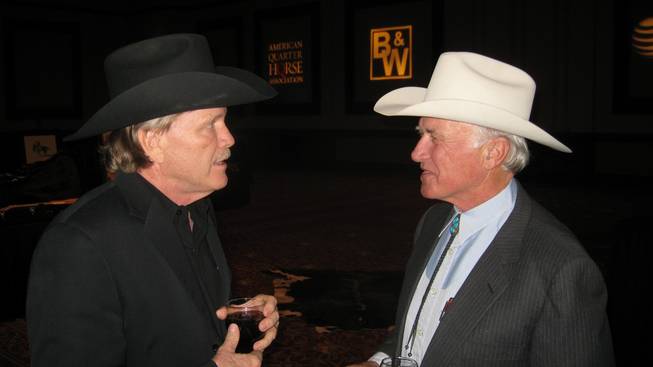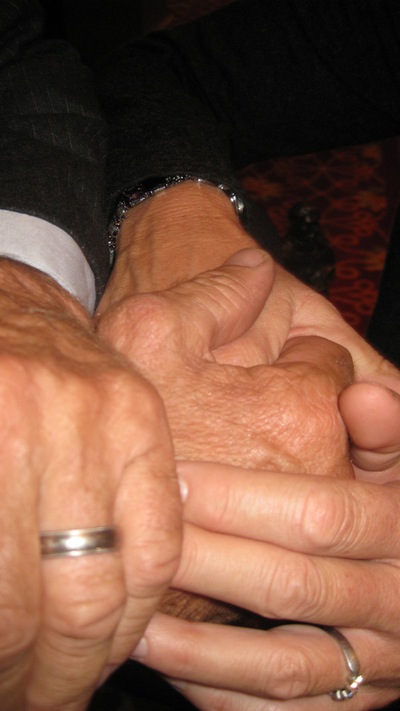
Larry Mahan chats up Las Vegas Events President Pat Christenson at the Wrangler Gold Buckle Gala on Monday night at South Point.
Tuesday, Nov. 30, 2010 | 2 p.m.
In his competitive prime, Larry Mahan was the Jerry West of professional rodeo.
Not that he knew exactly who Jerry West was back in the late 1960s.
“It was about 1969, and for some reason, the media just hooked on to me,” Mahan said Monday night after being honored with the 2010 Legend of Pro Rodeo Award at the third annual Gold Buckle Gala at South Point.
The award recognizes the sport’s greatest stars, and Mahan is certainly that, bridging the gap between small-time events at county fairgrounds and a national spectacle like the National Finals Rodeo at the Thomas & Mack Center.
After Monday’s gala, Mahan gladly recalled those days when the sport started to reach the masses with him as its unsuspecting spokesman.
“I came into this as a shy kid from (Salem) Oregon who just wanted to ride for 8 seconds and get a paycheck,” he says, chuckling. “But there was a program called the International Sports Club, and they had guys from different sports on it. They’d get together two times a year and would do a photo shoot, and they called me because at the time I was about to win my third all-around championship, and I was getting a lot of press at the time.”
So Mahan, who was growing into professional rodeo’s first crossover media star, was enlisted to appear in the national TV show, if only to mix the ingredients a little. He was joined by West, then a superstar guard with the Los Angeles Lakers and one of the NBA’s marquee players; Frank Gifford, who gained fame as a football star with the New York Giants and was embarking on a lengthy career as a sports broadcaster; Chicago Blackhawks legend Bobby Hull, who is still one of the NHL’s greatest figures; and Dallas Cowboys quarterback “Dandy” Don Meredith, who also went on to great fame as a member of the “Monday Night Football” broadcast team.
Joining that crew was a then-27-year-old roughstock rodeo contestant from the Intermountain West who knew very little about sports other than his own.
“I was so country that the only one I’d heard of out of this group was Don Meredith because he was a Dallas Cowboy,” Mahan said, flashing the easy smile that has made him one of the sport’s more engaging personalities. “I mean, I’d heard some of the names, but I didn’t know what the hell sport they played.”
It also hardly mattered that the young Mahan was lost to locate some of the show’s filming destinations on a map. The Catskills? “I was kind of trying to fake my way through it. They said we would fly into New York, and I got an idea that it was somewhere on the East Coast.”
But Mahan was a quick study. His capacity to put fans and media types at ease with his sharp sense of humor made him a sought-after public figure. His lengthy hair, famously loud plaid shirts and away-from-rodeo endeavors -- he earned a pilot’s license and even sang country music, to mixed acclaim -- led to appearances on TV talk shows and print ads, his fame rivaling that of rodeo/NFL star Walt Garrison among athletes with a wild west heritage (and a pinch between their cheek and gum).
Mahan, who earned his good fortune, winning five consecutive PRCA all-around championships from 1966-1970, the longest such string in the sport until Ty Murray reeled off six straight titles from 1989-1994 (Mahan also won two titles in the sport’s signature roughstock event, bull riding, in 1964 and 1966).
It didn’t take long for entertainment media to find a compelling story in the breakout rodeo star. Mahan’s successful quest to earn a then-record sixth PRCA championship was chronicled in the 1973 film “The Great American Cowboy,” which won that year’s Oscar for best documentary feature. Mahan’s good fortune was often viewed as uncanny; after competing in more than 1,200 rodeos, he never suffered an injury the sport deems “serious,” and only an arthritic thumb joint swollen to the size of a ping pong ball gives evidence of his past career.
Upon retiring, Mahan recorded a country album with the aptly simple title “Larry Mahan, King of the Rodeo.” One song befitting the artist: “There’s More to a Cowboy.” Today, Mahan hosts “Equestrian Nation” on RFD TV, which trumpets itself as “Rural America’s most important network.” He has a clothing line bearing his name, too, and sells horses on his Web site LarryMahan.com.
Expectedly, Mahan is a fan of the NFR in Las Vegas. It all has to do with Vegas’ capacity to expand rodeo’s national appeal.
“I was involved in the rodeo in Oklahoma City (the NFR’s home for two decades before it moved to Las Vegas in 1985), but they had pretty much maxed out their abilities to raise a purse and get the prize money up to where it needed to be at the time,” he says. “So, it was definitely a plus for the whole rodeo game to come here. No matter what the sport is, the almighty dollar runs the show. … This is a beautiful marriage working here, and this is by far the biggest thing that’s ever happened in rodeo.
“Vegas knows how to market sports, and entertainment, better than anyone.”
As Mahan speaks, he cradles his cowboy-on-a-horse trophy in his lap, gripping it with his battle-worn right hand. A friend cuts into the interview and says, “You are always smiling.”
“I smile a lot,” the rodeo star says, gleaming once more, “because I have a lot of reasons to smile.”
Follow John Katsilometes on Twitter at twitter.com/JohnnyKats.



Join the Discussion:
Check this out for a full explanation of our conversion to the LiveFyre commenting system and instructions on how to sign up for an account.
Full comments policy